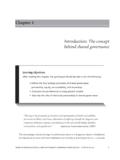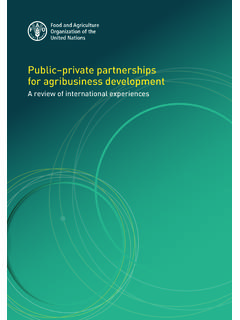Transcription of Political Culture and Democratic Governance in …
1 Journal of Power, Politics & Governance March 2014, Vol. 2, No. 1, pp. 55-66 ISSN: 2372-4919 (Print), 2372-4927 (Online) Copyright The Author(s). 2014. All Rights Reserved. Published by American Research Institute for Policy Development Political Culture and Democratic Governance in Zimbabwe Arthur Fidelis Chikerema and V .Chakunda Abstract The ideal of democracy has dominated Political science as a subject area in the contemporary world of politics and is undoubtedly the most credible and valued principle of social organization.
2 In the conscience of people it has come to mean the choice between constitutional and arbitrary authority, empowerment and marginalization, freedom and thraldom, voice and noiselessness. Thus as a global phenomenon, the general idea of democracy, both as theory and praxis has become inestimably seductive to practically all peoples and countries(Prah) Scientist has placed less attention on the relationship between Political Culture and Democratic Governance in Africa in general and Zimbabwe in particular.
3 More emphasis has been placed on neo-colonialism, elections and electoral systems ignoring the importance of Political Culture in Democratic African country purport to be Democratic but findings point out that, Africa`s Political landscape is defines by a Culture of impunity and that the ethos of good Governance have been mutilated. As for Zimbabwe, Democratic decay and violence has been the defining feature of the Political environment.
4 A Culture of impunity characterized by electoral fraud has engulfed Zimbabwe`s Political landscape and this has defined the Political Culture of the system of Governance . Violence and Political instability has negatively affected Zimbabwe`s Political Culture is extremely vital and crucial for Democratic practice and the ideal of democracy is highly dependent upon a particular Political Culture in a given country. Political violence, institutionalized intimidation, thugogracy, lawlessness, inability to accept defeat, and multivariate conflicts have marked Zimbabwe s Political landscape ,promoted by resource distribution, ideological contestations, social differentiation along class, Political party, gender and ethnic cleavage, clearly have an enormous impact on the prospects for nurturing and consolidation of Democratic Governance in Zimbabwe.
5 Keywords: Culture , Political Culture , democracy, Governance and good Governance 1 KwesiKwaPrah, Democracy, Education, Literacy and Development, CASAS;1 56 Journal of Power, Politics & Governance , Vol. 2(1), March 2014 introduction Culture is undoubtedly a crucial determinant of the history, identity and destiny of an given society( K. Matlosa )2.
6 The dynamics of a social fabric of any society, therefore revolve principally around the Culture of that society(Prah , as cited in K. Matlosa) Culture is therefore the foundation and cornerstone of any Political system that promote or undermine Governance in any society. Political Culture has both direct and indirect bearing and permutations on Political and economic Governance process, and as such has influenced a considerable degree of instability or stability of a country s Political system.
7 Matlosa has conceived Political Culture as a concept that denotes a broad array of norms, values, beliefs, attitudes and traditions that shape systems, institutions and processes of Governance . Political Culture is one of the most powerful influences that shape a Political system. It creates norms and beliefs about howpeople should behave and these norms influence social behavior4. Heywood corroborates the above observation by arguing that Culture , which he also terms politics of the mind is crucial for Democratic Governance and stability given that it builds societal perceptions andexpectation regarding the running of national affairs by governments5.
8 He further argue that popular beliefs and symbols and values, structure both people s attitudes to the politicalprocess and crucially, their view of the regime in which they live , most particularly whether or not they regard their regime as rightful or legitimacy. Legitimacy is thus the key to Political stability and it is nothing less than the source of the regime s survival and successes,6. Surely Political Culture is heavily embedded in the process of Political socialization which have been marred by propaganda and politics of patronage in the Zimbabwean Political system.
9 2 Matlosa,K. Political Culture and Democratic Governance in Southern Africa, SAPES;3 3 Ibid, 3 4 Matlosa,K. Political Culture and Democratic Governance in Southern Africa, SAPES;98 5 Heywood,A. Politics, Mcmilian;185 6A. Heywood, Politics, Mcmilian, 185 Chikerema & Chakunda 57 A dominant party has monopolized the agents of Political socialization thus , the family, educational institution, religious institutions, mass media, Political parties, civil society and the government.
10 Paper grapples with the complex relationships and interface of instability and Democratic Governance in Zimbabwe. Development of a Democratic Political Culture Political Culture as a perceived and formalized perception of politics that is shared among a particular group can be analysed, contextualized and historicized. Each and every Political system has its unique historical framework that can be analysed and consequently be used in its encompasses both the Political ideals and the operating norms of a polity.






